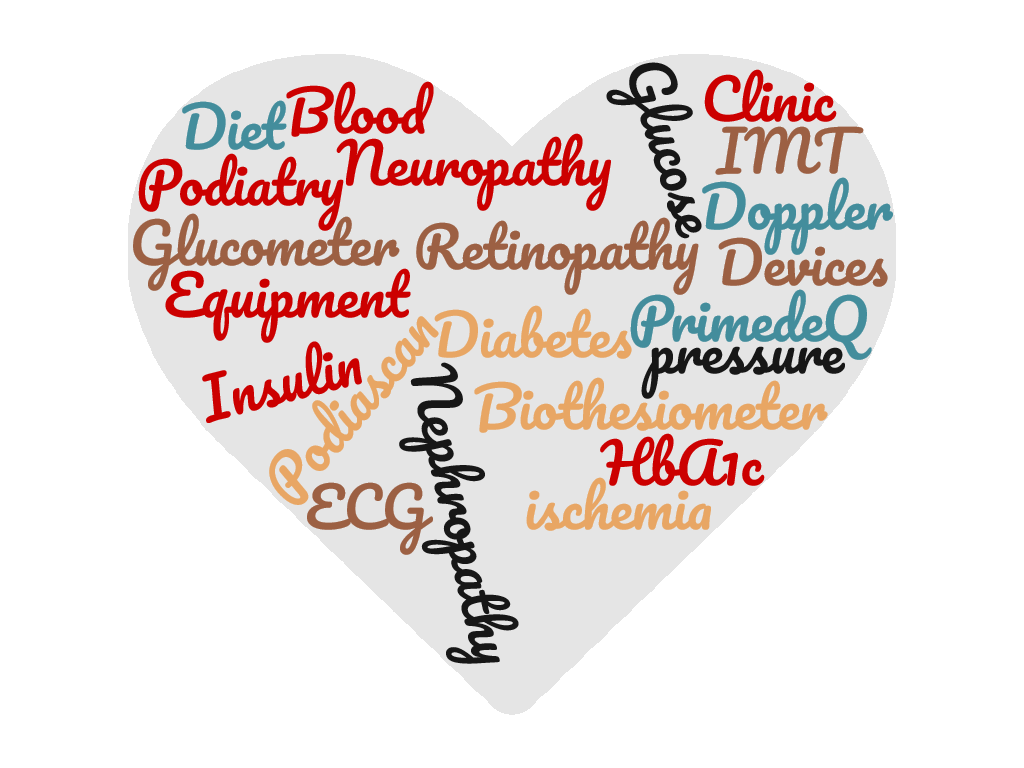
There is no cure for diabetes. Uncontrolled diabetes can lead to impairment/loss of eyesight, kidney, Coronary Heart disease, neuropathy etc. The approach towards treatment of diabetes involves screening, early detection and control. What medical equipment is needed for diabetes screening and treatment of various problems associated with it?
India is deemed as the world’s diabetes capital. There are estimated 72.96 million cases of diabetes in adult population of India. The prevalence of diabetes in India has remained at 11.8% in the last four years, according to the National Diabetes and Diabetic Retinopathy Survey report released by the health and family welfare ministry in Oct 2019. Diabetes, one of the major lifestyle diseases globally, adversely impacts health and quality of life.
Due to high rate of prevalence already at 11.8% and growing incidence of diabetes in India, several specialised diabetes clinics are being set-up in the country and more are expected to come up. Lets look at medical equipment needed for diabetes screening and treatment.
A comprehensive diabetes set-up includes medical equipment for screening and treatment of retinopathy, nephropathy, neuropathy, Cardio- vascular issues, foot care, wound care, diet counselling etc.
Lab Facilities
Diabetes is a metabolic disease that causes high blood sugar. Naturally testing for sugar is fundamental to diabetes screening. The HbA1c test, also known as the haemoglobin A1c or glycated haemoglobin test, is an important blood test that gives a good indication (bio-marker) of how well your diabetes is being controlled.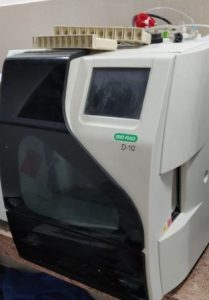
There are several other blood tests done for early detection and status of control.
Hence good lab services are critical to a good diabetes clinic. The Laboratory services should preferably include Biochemistry, Hematology, Pathology, Microbiology and Serology. Medical equipment needed at the minimum are cell counter, bio-chemistry analyser, electrolyte analyser, HbA1C analyser, microscope, centrifuge, incubator, autoclave, hot air oven, water bath etc.
Renal Failure – Detecting Diabetic Nephropathy
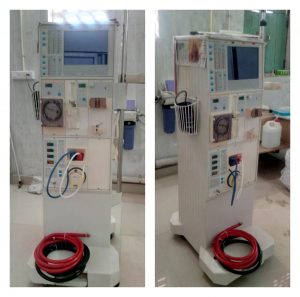
More than 40% of kidney disease in our country occurs due to diabetes. If detected at an early stage, kidneys can be protected. Blood tests include early and late markers of kidney disease testing for ‘microalbuminuria’ every 3-6 months and other renal function tests to further evaluate the status of the kidneys.
For those with Kidney failure, dialysis would be required.
Eye Care – Detecting Diabetic Retinopathy
Diabetic retinopathy is one of the major reasons for visual impairment and blindness among the diabetic patients. Every patient with diabetes must take an annual comprehensive eye examination involving:
- Checking vision (refraction) using autorefractor
- Measurement of the eye pressure using tonometer
- Anterior segment examination by slit lamp for cataract assessment
- Retinal/ Fundus examination of the back of the eye
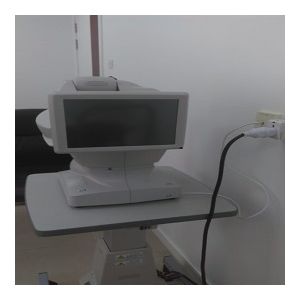
Fundus Camera is used for examining the back of the eye or the Fundus, in particular the status of Retina in case of diabetic retinopathy screening. The procedure is called Fundus Fluorescein Angiography (FFA). Fundus camera is one of the most important medical equipment needed for diabetic care and retinopathy detection.
An OCT machine may also be used to perform Optical Coherence Tomography (OCT), a non-contact non-invasive retinal imaging technique using infrared light.
Good blood sugar control is the most important aspect of treatment for retinopathy. However, in advanced cases, laser photocoagulation or Vitrectomy are used for treatment of abnormalities in retina.
Foot Care (Podiatry) – Detecting Diabetic Neuropathy
Foot is 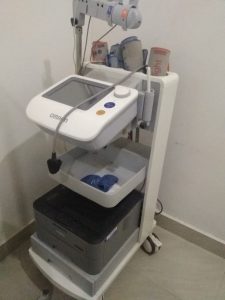 one of the major organs adversely impacted by Diabetes due to peripheral artery disease and peripheral neuropathy (a condition where the nerves get affected). People with diabetes have an increased risk of ulcers and damage to feet. Diabetic foot problems include bunions, corns, calluses, hammertoes, fungal infections, dryness of the skin, and ingrown toenails. Wounds refuse to heal fast and patients may end up having gangrene leading to foot amputation.
one of the major organs adversely impacted by Diabetes due to peripheral artery disease and peripheral neuropathy (a condition where the nerves get affected). People with diabetes have an increased risk of ulcers and damage to feet. Diabetic foot problems include bunions, corns, calluses, hammertoes, fungal infections, dryness of the skin, and ingrown toenails. Wounds refuse to heal fast and patients may end up having gangrene leading to foot amputation.
A routine foot examination to check for early symptoms of neuropathy, ischemia (reduced blood supply) and foot problems should be done for Diabetes patients.
- Biothesiometry – Biothesiometer helps to detect and quantify loss of foot sensation in patients with diabetes.
- Doppler – Doppler helps in detection of decreased blood circulation in the foot.
- Foot pressure distribution measurement – Foot/ Plantar pressure distribution measurement system is used for measuring the pressures in regions of the foot that are prone to getting calluses and corns. This instrument is also used for designing special diabetic footwear that effectively redistributes the pressures, thereby preventing the formation of calluses and corns.
- Vascular Screening – Non-invasive vascular screening helps in whole body vascular assessment.
- Podiatry, Pain & Wound care management – There are a number of products that help in pro-active foot care and wound care.
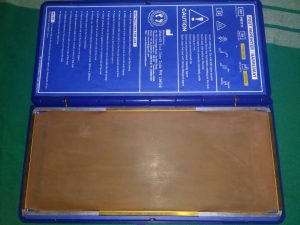
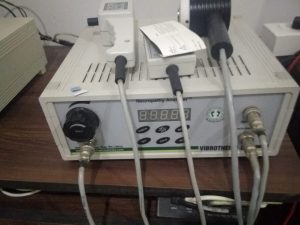
Cardiac care
Diabetes is a major contributing factor for heart disease. Patients with diabetes may also suffer from ‘silent ischemia’, wherein symptoms such as chest pain or pressure, pounding heartbeat, shortness of breath, jaw or arm pain, and sweating may not be felt until serious complications occur. Hence, regular screening and follow up visits is required to identify risk factors and heart problems.
Various tests can help assess heart function are
- An electrocardiogram (ECG)
- Echo/ ultrasound machine for Carotid intimal medial thickness (IMT), endothelial dysfunction and arterial stiffness tests
- Treadmill test (TMT)
- Ambulatory BP monitoring
Physiotherapy and Diabetes
Exercise plays an important role in diabetes control. Physiotherapist advice can help immensely in proper physical activity and exercises. Physiotherapy can also help with pain management and pro-active management of complications associated with diabetes.
A combination of resistance and aerobic exercises is best. Aerobic exercise is effective in strengthening the heart and respiratory capacity, while burning excess fat. Resistance exercises strengthen muscles and bones. It increases the body’s metabolic rate over time and can contribute to the control of your blood sugar.
A comprehensive Physiotherapy set-up includes –
- Ultrasound therapy
- Traction machine
- Interferential therapy (IFT)
- Shortwave diathermy
- Wax therapy
- Electrical stimulation/ TENS
- IR red light therapy
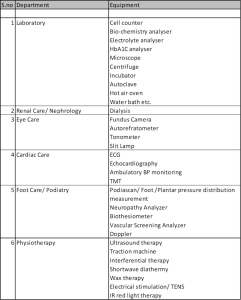
List of Medical Equipment for Diabetes Care
Other Facilities
Nutrition & Diet counselling is of paramount importance in diabetes management. A pharmacy is essential. Dental gum problem (periodontal disease) is considered to be one of the major complications of uncontrolled diabetes which can be followed by loss of teeth. Hence dental care or referral facility is needed. Other facilities that may be frequently required for advanced cases are Surgical Dressing, X-Ray, Diabetic Foot Wear and Home Care.
Not all services are essential right in the beginning. One may decide upon basic essentials and referral tie-ups to start with.
PrimedeQ is an eMarketplace for buying, selling, renting & servicing medical equipment. We offer all kindsof New & Used medical equipment. Contact us on +917019759765 or +918971223957 for any medical equipment or related spares & services.
https://in.linkedin.com/in/shanthi-mathur-ab07838
